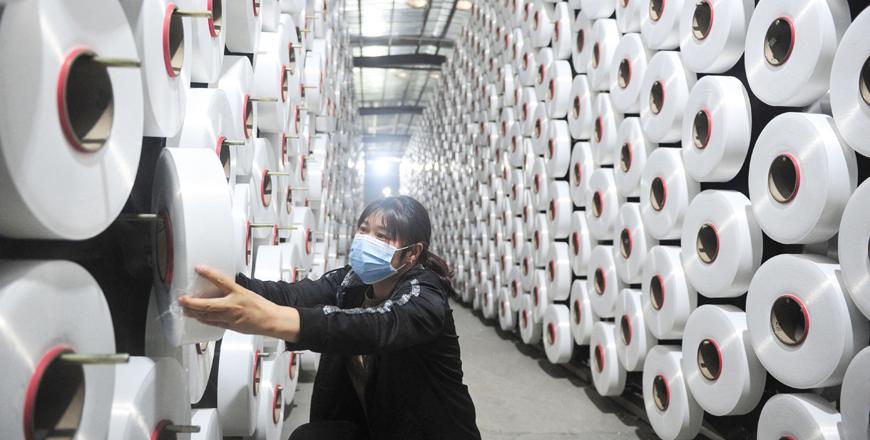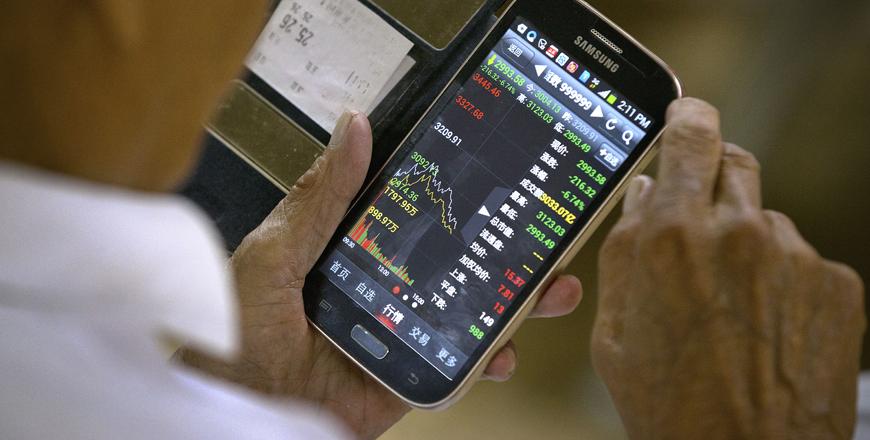You are here
China signals policy easing as economy falters
By Agencies - Jun 01,2014 - Last updated at Jun 01,2014
SHANGHAI — China will further ease monetary policy to kick-start the world's second largest economy by cutting the amount of funds that some banks must hold in reserve.
According to a statement posted on the central government website, the state council, China's Cabinet, decided after a meeting last week that it would trim reserve requirements for banks which lend to the agricultural sector and small enterprises.
It gave no details of the timing or sum involved.
China launched a similar, targeted reserve cut for banks in rural areas just over a month ago as worries mount that its economy — a key driver of world growth — is slowing more sharply than expected.
"Currently, the movement of the economy is stable, but downward pressure is still relatively large," the state council said, adding the government would "fine-tune" policy at an appropriate time.
China's economy grew an annual 7.4 per cent in the first quarter of this year, weaker than the 7.7 per cent in the October-December period and the worst since a similar 7.4 per cent expansion in the third quarter of 2012.
Premier Li Keqiang in March announced an economic growth target of "around 7.5 per cent" for this year.
"It is clear that the government has become more concerned about the continued economic slowdown and wants to further increase the strength of policy support," Wang Tao, a Hong Kong-based economist for bank UBS, said in a research note.
"Policy support will strengthen as the economy weakens further, so as to defend the growth target for 2014," she added.
The state council announced a basket of other measures on Friday, including more financial support for small companies, lowering the cost of financing and cutting administrative fees, the statement indicated.
China's economy grew an annual 7.7 per cent in 2013, the same level as 2012, which was the worst pace since 1999.
But some analysts believe China will refrain from more aggressive measures to boost growth, such as slashing interest rates or cutting reserve requirements for all banks, on worries excessive credit could pose financial risk.
"Broad cuts to [reserve requirements] and benchmark interest rates are only likely if May and June data continue to surprise on the downside," investment bank Goldman Sachs said in a research note on Saturday.
Separately, data showed that fixed-asset investment, a main measure of government spending on infrastructure, rose at its slowest pace in more than 12 years in January-April, fuelling calls for Beijing to act to boost the economy.
Growth in the world's second-largest economy is decelerating, but leaders in Beijing say they want to wean the country off investment as the key driver of expansion and shift the focus to consumer spending.
Fixed-asset investment increased 17.3 per cent year on year in the first four months of 2014, slowing from 17.6 per cent in the first three months, the National Bureau of Statistics (NBS) indicated.
The figure is only released cumulatively, and the reading was the lowest since a 13.7 per cent increase for the whole of 2001, NBS data showed.
It was one of several statistics adding to concerns over the weakening of China's economy, a key driver of global growth, and analysts called on Beijing to ease its monetary policy.
"The pressure for more policy easing continues to build," Zhang Zhiwei, Nomura's economist based in Hong Kong, said in a research note.
Industrial output, which measures production at factories, workshops and mines, increased 8.7 per cent year on year in April, the NBS said, edging down from 8.8 per cent a month earlier. The indicator rose 8.6 per cent in the first two months of the year, the slowest in five years, previous data showed.
And retail sales, a gauge of consumer spending, grew 11.9 per cent year on year, the NBS added, down from a 12.2 per cent rise in March.
Officials have publicly ruled out a massive stimulus to kick start growth but have instead introduced a series of smaller measures, including a cut in the amount of money rural banks have to keep in reserve, tax breaks for small enterprises and targeted infrastructure outlays.
Further stimulus?
But ANZ analysts Liu Ligang and Zhou Hao said the growth target was unlikely to be achieved without a cut in interest rates as well.
If the government still views that achieving a 7.5 per cent growth target is important for its credibility, China's monetary policy will have to play its necessary role by easing further in order to help pull the economy out of a state of lethargy," they said in a report.
China in April cut the reserve requirement ratio for rural banks by up to two percentage points, the first such move since May 2012, when it slashed the ratio to 20 per cent for large financial institutions and 16.5 per cent for smaller ones.
It has not reduced lending rates since July 2012.
Some economists, however, believe the current policies are sufficient to prevent growth from decelerating further and Beijing is unlikely to rush to take more aggressive measures.
In a research note Louis Kuijs and Tiffany Qiu of Royal Bank of Scotland attributed the investment growth deceleration to earlier monetary tightening, corporate reluctance to expand capacity, and a slowdown in the real estate sector.
"We expect the current approach to macroeconomic policy — supporting growth without resorting to major stimulus — to be broadly maintained," they said.
China's bank lending fell sharply in April from March, data showed, after central bank governor Zhou Xiaochuan reportedly ruled out the possibility of any massive stimulus at a recent forum, noting that his institution would only fine-tune its policy.
In the meantime, China is stepping up a crackdown on perks for military officials, targeting extravagant wedding ceremonies and funerals as it widens a graft probe into the use of public funds for banquets, travel and gifts, state media reported.
Perks enjoyed by officials of the People's Liberation Army, including the use of secretaries, are among the issues being investigated by the military inspection teams, official news agency Xinhua has reported.
Inspectors will look into "extravagant wedding ceremonies and funerals" held by military officials, besides strengthening investigations into public funds used for banquets, travel and gifts, it said.
The anti-corruption drive has made progress in cleaning up illicit apartments and vehicles, Xinhua reported, but is still "far from expectations".
A campaign on widespread corruption by President Xi Jinping has led to the detention of some senior government officials and executives in state-owned firms, including the country's biggest oil and gas producer, PetroChina Co. Ltd.
Xi has also targeted officials in the military in the bid to weed out graft and consolidate his power. Late last year 18 military inspection teams fanned out to various departments and area commands.
Related Articles
BEIJING — China's economic growth accelerated in the first quarter of the year to 4.8 per cent, official data showed on Monday, but the gove
SHANGHAI/BEIJING — China's central bank cut interest rates and lowered the amount of reserves banks must hold for the second time in two mon
BEIJING — China logged its slowest economic growth since the initial COVID outbreak on Friday, expanding just 0.4 per cent in the second qua


















